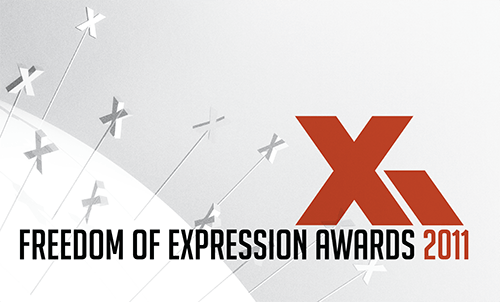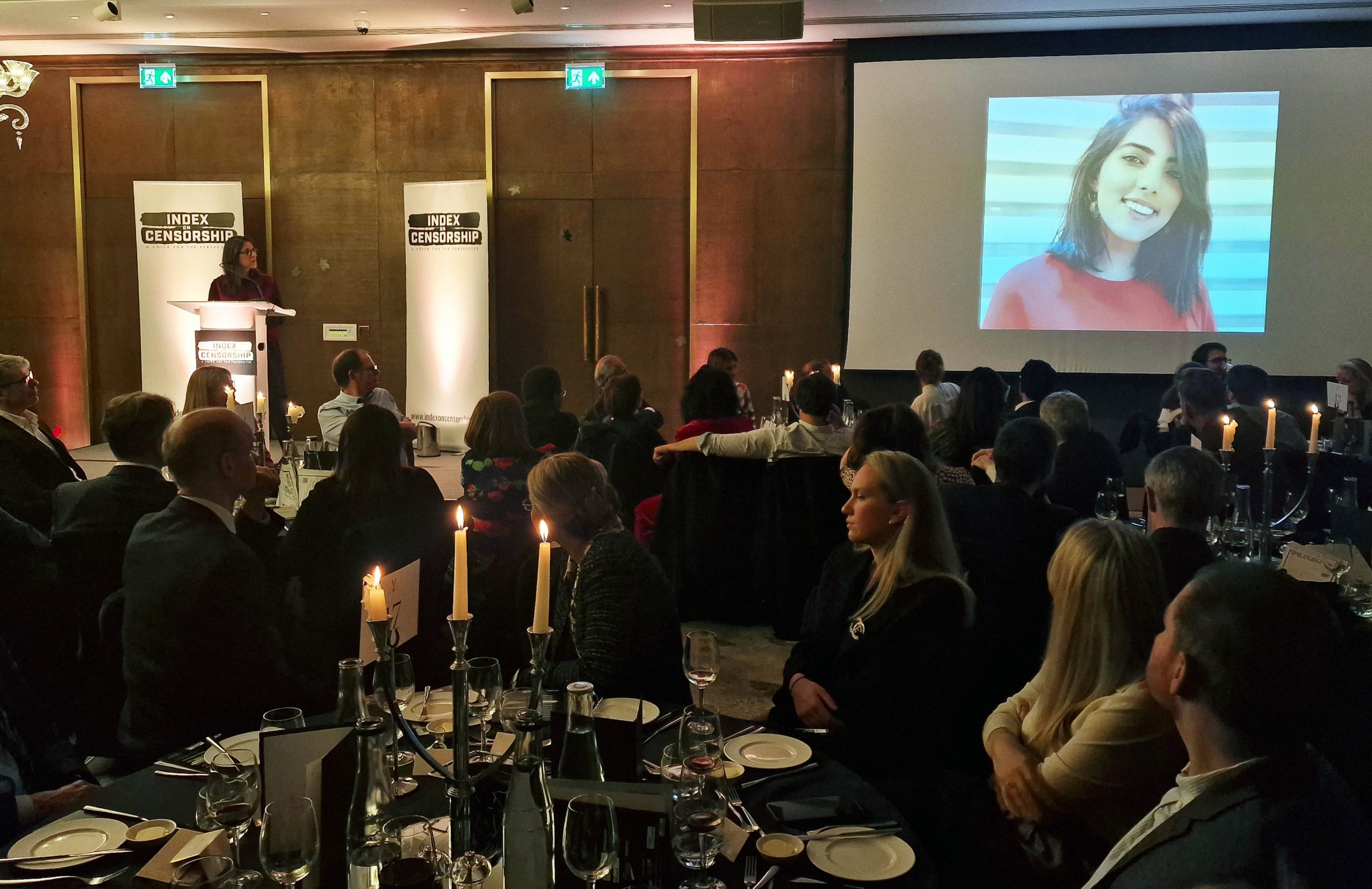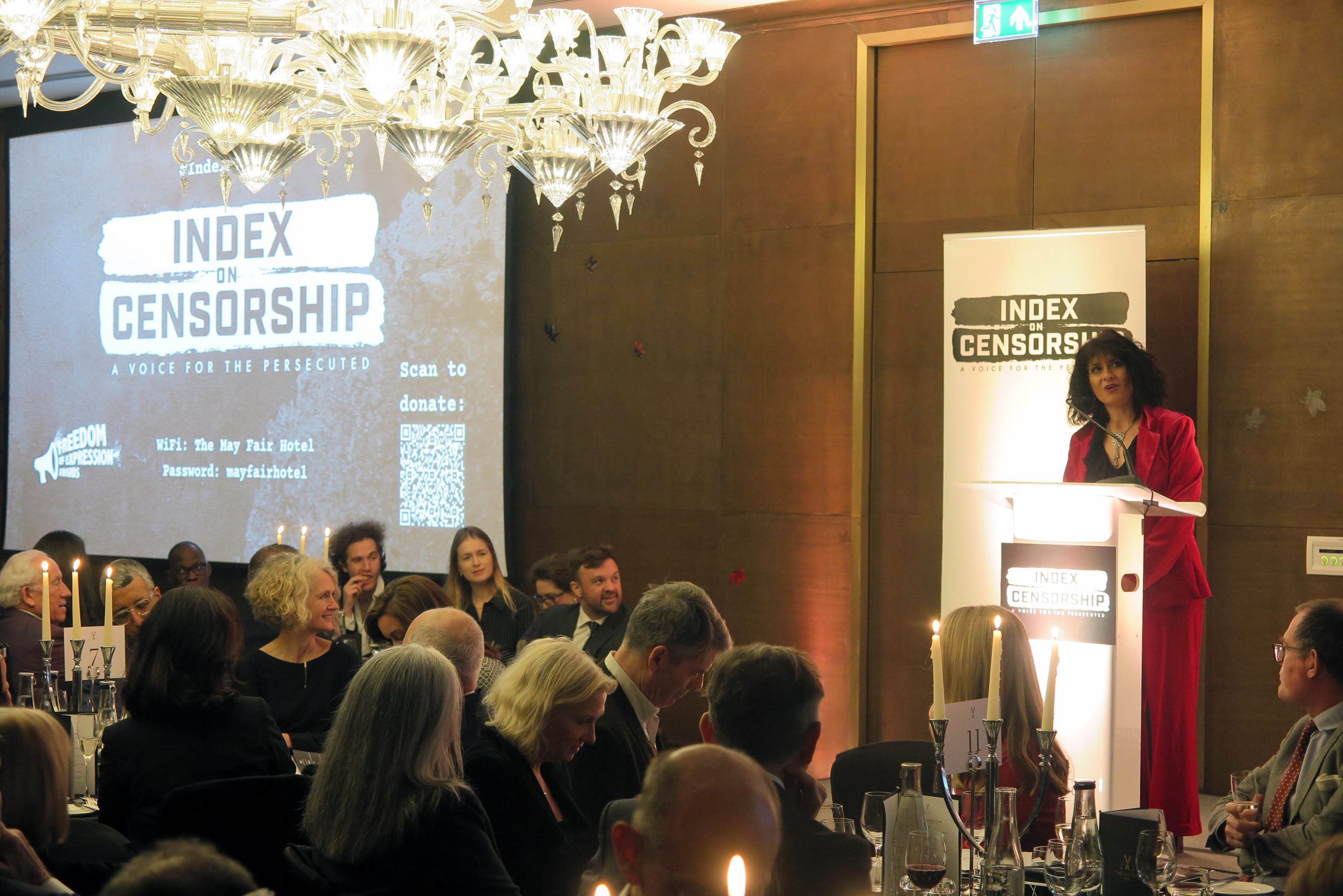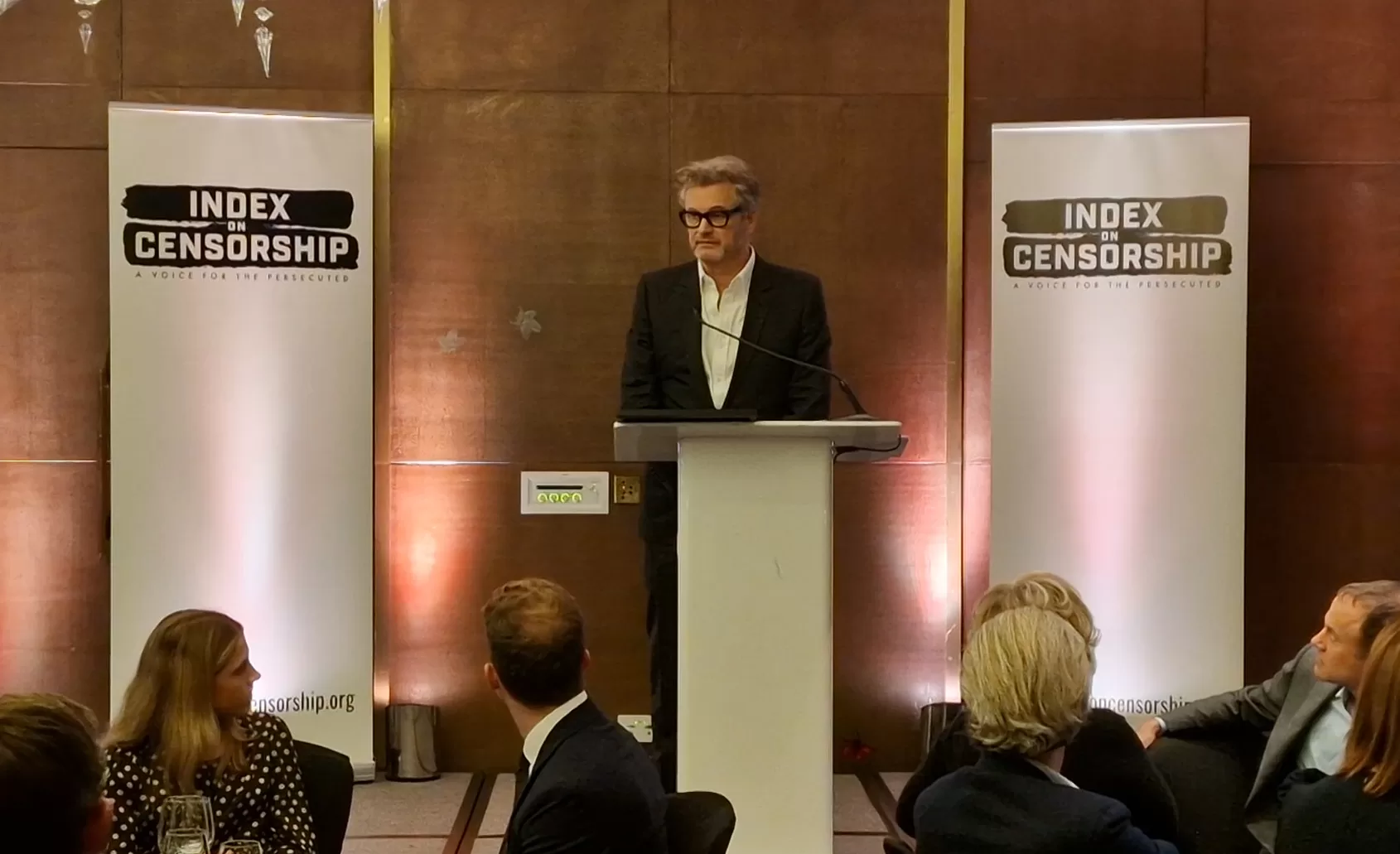[vc_row full_width=”stretch_row_content_no_spaces” css_animation=”fadeIn” css=”.vc_custom_1485788838344{padding-top: 250px !important;padding-bottom: 250px !important;background-image: url(https://www.indexoncensorship.org/wp-content/uploads/2016/11/Web-Logo-1.png?id=81063) !important;background-position: 0 0 !important;background-repeat: repeat !important;}”][vc_column][/vc_column][/vc_row][vc_row css=”.vc_custom_1472525914065{margin-top: -150px !important;}”][vc_column][vc_row_inner equal_height=”yes” content_placement=”middle”][vc_column_inner el_class=”awards-inside-desc” width=”1/2″][vc_custom_heading text=”FREEDOM OF EXPRESSION AWARDS 2011″ use_theme_fonts=”yes”][vc_column_text]Index on Censorship’s Freedom of Expression Awards exist to celebrate individuals or groups who have had a significant impact fighting censorship anywhere in the world.
- Awards were offered in four categories: Arts, Campaigning, Journalism and New Media
- There was a Special Commendation for Belarusian political prisoners
- Winners were honoured at a gala celebration in London at the Royal Institute
[/vc_column_text][/vc_column_inner][vc_column_inner width=”1/2″][vc_video link=”https://www.youtube.com/watch?v=UrJ0xLuZyz0″][/vc_column_inner][/vc_row_inner][/vc_column][/vc_row][vc_row css=”.vc_custom_1472608310682{margin-top: 0px !important;margin-bottom: 20px !important;}”][vc_column][vc_custom_heading text=”WINNERS” font_container=”tag:h1|text_align:center” use_theme_fonts=”yes” css=”.vc_custom_1477036676595{margin-top: 0px !important;}”][vc_row_inner][vc_column_inner width=”1/3″][staff name=”Tunileaks” title=”New Media Award” color=”#28a7cc” profile_image=”21683″]After accepting the award, Sami Ben Gharbia, co-founder of Nawaat, said: “This award is very important to us. It is given to us the very year we are celebrating the Tunisian revolution and seven years of our existence as a collective blog, which was censored from its launch by Ben Ali’s regime.” TuniLeaks is a selection of the WikiLeaks State Department cables published by Nawaat.org, an independent group blog run by Tunisian net activists. TuniLeaks, like its parent site Nawaat, is entirely independent and does not receive funds from any political party. The TuniLeaks cables revealed the extent of the corruption deeply entrenched in many aspects of Tunisian life. Despite attempts to block the site, news of the cables being released swiftly spread around the country and Nawaat helped informal media networks link communities that had been cut off by government censors. Nawaat highlights how important transparency is in a country like Tunisia, where citizens had for so many years been cut off from vital information and dialogue. “The aim is to get everyone to read, to get an idea and give meaning to the facts provided,” the website states. “The debate is open.”[/staff][/vc_column_inner][vc_column_inner width=”1/3″][staff name=”Gao Zhisheng” title=”Bindmans Law and Campaigning Award” color=”#28a7cc” profile_image=”20668″]Gao Zhisheng has been persecuted by the state for speaking out on human rights issues. Gao, a self-taught lawyer, forged a career representing the underdog in cases involving medical malpractice, land redistribution, employment disputes and forced sterilisation. He has also defended journalists and religious minorities including Christians and members of Falun Gong. In 2005, he resigned from the Communist Party and wrote an open letter to President Hu Jintao and Prime Minister Wen Jiabao, documenting the suffering of Falun Gong practitioners and calling on the leaders to end their “large-scale, organised” abuse. Security forces took Gao from his home in Shaanxi province on 4 February 2009. Gao claimed the security forces tortured him. The state denied any knowledge of his whereabouts until January 2010, when a foreign ministry official said the lawyer was “where he should be”. After briefly reappearing Gao disappeared again in April 2010, and the Chinese state has refused to register him as a missing person.[/staff][/vc_column_inner][vc_column_inner width=”1/3″][staff name=”Ibrahim Eissa” title=”The Guardian Journalism Award” color=”#28a7cc” profile_image=”21686″]After accepting the award Ibrahim Eissa said “I consider this to be a prize for Tahrir Square”. Eissa is Egypt’s leading independent editor, described as a “one-man barometer of Egypt’s struggle for political and civic freedom”. Throughout his career, he has faced prosecution when his push for media freedom has fallen foul of the government.
In 2010, he was fired from his position as editor of the independent newspaper al Dostour, after new owners bought the paper; his popular satellite talk show was also taken off air. His sacking came in the midst of a wider media crackdown in the run-up to the parliamentary elections, when Mubarak’s ruling National Democratic Party emerged victorious amid accusations of unprecedented vote rigging. When Eissa was sacked from his job last year, the novelist Alaa al Aswany wrote: “Ibrahim Eissa did not oppose the government; he opposed the system … He called for real democratic change through free and fair elections and regular change at the top.”[/staff][/vc_column_inner][/vc_row_inner][vc_row_inner][vc_column_inner width=”1/3″][staff name=”MF Husain” title=”The Intelligent Life Arts Award” color=”#28a7cc” profile_image=”42319″]Celebrated and critically-acclaimed Indian artist Maqbool Fida (MF) Husain has been battling against censorship in his native India and elsewhere for close to 20 years. Born in 1915, he is recognised as one of India’s greatest living artists. He has lived in exile since 2006. Husain’s work has caused controversy in sections of the conservative Hindu community, who regard his depiction of Hindu gods and goddesses in the nude as blasphemous and offensive. Husain has received numerous threats and exhibitions of his work have come under attack on several occasions; in India, he has faced hundreds of legal actions relating to his work. In January 2011, three of Husain’s artworks were removed from the Indian Art Summit in New Delhi following threats. Organisers said they could not guarantee the safety of the artwork or of those visiting the exhibition.[/staff][/vc_column_inner][vc_column_inner width=”1/3″][staff name=”Belarus’s prisoners of conscience” title=”Special Commendation” color=”#28a7cc” profile_image=”21725″]Sir Tom Stoppard said: “This Index on Censorship award is all the more important as the figure of prisoner of conscience should have been consigned to history. Yet in Europe in 2011 there are 42 prisoners of conscience held by the government of Belarus.” This award is dedicated to all the prisoners of conscience who have been detained because they exercised their right to free expression in criticising President Lukashenko. On 19 December, the night of the presidential elections in Belarus, a large demonstration was held in Independence Square in Minsk. The protest was dispersed violently, with the arrest of around 700 people. Those held were treated appallingly. Natalia Koliada, the co-founder of the Belarus Free Theatre, was one of those arrested. The Free Theatre had performed at an event organised by Index on Censorship just two weeks previously at the Young Vic. Whilst Koliada was in prison, guards made vile threats: “You are animals. We want to kill you. Our dream is to kill you.” Those detained were not held in cells, but had to stand in freezing prison corridors. All the prisoners had biometric photographs taken and were fingerprinted and filmed. Ales Mikhalevich, one of seven presidential candidates who was detained, has subsequently made allegations of torture. In total, 42 people face criminal prosecutions for organising a “mass disturbance”. The charges carry a prison sentence of up to 15 years. With so many presidential candidates amongst those charged, it is likely there is a political motive behind the charges.[/staff][/vc_column_inner][vc_column_inner width=”1/3″][/vc_column_inner][/vc_row_inner][/vc_column][/vc_row][vc_row][vc_column][vc_custom_heading text=”JUDGING” font_container=”tag:h1|text_align:center” use_theme_fonts=”yes”][vc_row_inner el_class=”mw700″][vc_column_inner][vc_column_text]
Criteria – Anyone involved in tackling free expression threats – either through journalism, campaigning, the arts or using digital techniques – is eligible for nomination.
Any individual, group or NGO can nominate or self-nominate. There is no cost to apply.
Judges look for courage, creativity and resilience. We shortlist on the basis of those who are deemed to be making the greatest impact in tackling censorship in their chosen area, with a particular focus on topics that are little covered or tackled by others.
Nominees must have had a recognisable impact in the past 12 months.
Where a judge comes from a nominee’s country, or where there is any other potential conflict of interest, the judge will abstain from voting in that category.
Panel – Each year Index recruits an independent panel of judges – leading world voices with diverse expertise across campaigning, journalism, the arts and human rights.
The judges for 2011 were:
[/vc_column_text][/vc_column_inner][/vc_row_inner][vc_row_inner][vc_column_inner width=”1/3″][staff name=”Gugulethu Moyo” title=”Executive director of MLDI” color=”#28a7cc” profile_image=”81072″]Awards judge Gugulethu Moyo introduced the nominees for the Bindmans Law and Campaigning award
“When thinking about freedom of expression, it’s easy just to focus on the headlines. But it is often the work behind the scenes that makes the difference, so the law and campaigning award is crucial in recognising the champions of free speech. This year’s shortlist demonstrates clearly that tools to silence are used by both dictatorships and democracies – and that those committed to making sure unheard voices are listened to often do so at great personal risk. This year we turn our attention to Pakistan, where those working to change an incredibly hostile climate for free speech have found themselves under fierce attack. In China, those defending campaigners against land redistribution or promoting religious freedom meet with heavy penalties and often risk their lives. And we look at the United States, where the government’s preoccupation with national security has overridden one of its citizen’s human rights. It’s more important than ever to honour those who take on this difficult and complex work – and it’s thanks to them that rigorous legal work plays a key role in keeping freedom of expression in a prominent position on the international stage.”[/staff][/vc_column_inner][vc_column_inner width=”1/3″][staff name=”David Rowan” title=”Editor of Wired UK” color=”#28a7cc” profile_image=”80222″]Awards judge David Rowan introduced the nominees for the Index on Censorship New Media Award, supported by Google
“In a year when WikiLeaks held government activities to unprecedented scrutiny, and Facebook and Twitter empowered citizens in articulating their concerns, the judges sought to honour those especially courageous internet activists who braved hostile conditions to promote free expression. Wen Yunchao, based in Guangdong, has taken huge risks to become one of China’s most outspoken bloggers and campaigners for free speech – not least by organizing a Twitter “Empty Chairs” protest to mark Liu Xiaobo’s winning the Nobel Peace Prize. The activists behind TuniLeaks – a collaboration between Nawaat.org and WikiLeaks – confirmed with cold documents the widely criticised corruption of President Ben Ali’s regime, and helped focus public discontent. The judges recognised the long-term role played by the Tor Project as a means of helping activists bypass traditional censors – whose impact was evident in huge traffic spikes as protests grew in Egypt and Tunisia. Finally, the judges wanted to pay special tribute to Wael Ghonim, a local Google employee detained for 11 days by the Egyptian police, who was revealed to be the administrator of the Facebook page ‘We are all Khaled Said’. Named for a young businessman who died in Egyptian police custody, the page became a rallying point in the popular uprising.”[/staff][/vc_column_inner][vc_column_inner width=”1/3″][staff name=”Hans-Ulrich Obrist” title=”Curator, critic and historian of art” color=”#28a7cc” profile_image=”80221″]Awards judge Hans-Ulrich Obrist introduced the Intelligent Life Arts Award
“In the field of the arts, liberty of expression is very often taken for granted. However, one should not forget that some artists struggle to express themselves in a lot of places around the world.
“Through different mediums, the three nominees have battled against censorship in remarkable ways. The cineaste Jafar Panahi’s unfailing support for Iran’s 2009 Green Revolution resulted in his ban from filming for 20 years. Gurpreet Kaur Bhatti’s great play Behzti satirised censorship, depicting with particular insight the relationship between creativity and controversy. Lastly, MF Husain’s immense courage and brave rejection of the prevalent academicism has led to self-exile in the UK and UAE as a result of sustained campaigns of legal harassment and mob violence. At the hour of globalisation, one should remember Edouard Glissant’s invigorating concept of mondialité: poetics and politics not apprehended as two distinct categories, but poetry clearly opening out into politics.”[/staff][/vc_column_inner][/vc_row_inner][vc_row_inner][vc_column_inner width=”1/3″][staff name=”Lindsey Hilsum” title=”Journalist, Channel 4 News” color=”#28a7cc” profile_image=”80223″]Awards judge Lindsey Hilsum introduced the nominees for the Guardian Journalism award
“In the era of new media, some might think traditional journalism is yesterday’s story, but this year’s entries prove that’s not so. Today’s facebookers and tweeters are building on the bravery and dedicated investigative skills of old-school journalists, many of whom still face persecution. I’m struck by how those on this year’s shortlist don’t give up, whatever the forces brought to bear against them. When their publication is closed down, they start a new one. When released from prison, they start reporting where they left off. They are an inspiration.”[/staff][/vc_column_inner][/vc_row_inner][/vc_column][/vc_row][vc_row css=”.vc_custom_1473325552363{margin-top: 0px !important;margin-bottom: 20px !important;padding-top: 0px !important;padding-right: 15px !important;padding-bottom: 0px !important;padding-left: 15px !important;}”][vc_column css=”.vc_custom_1473325567468{margin-top: 0px !important;margin-bottom: 0px !important;padding-top: 0px !important;padding-bottom: 0px !important;}”][awards_gallery_slider name=”GALLERY” images_url=”80470,80469,80468,80467,80466,80465,80464,80463,80462,80461,80460,80459,80458,80457,80456,80455,80454,80453,80452,80451,80450,80449,80448,80447,80446,80445,80444,80443,80442,80441,80440,80439,80438,80437,80436,80435,80434,80433,80432,80431,80430,80429,80428,80427,80426,80425,80424,80423,80422,80421,80420,80419,80418″][/vc_column][/vc_row]




